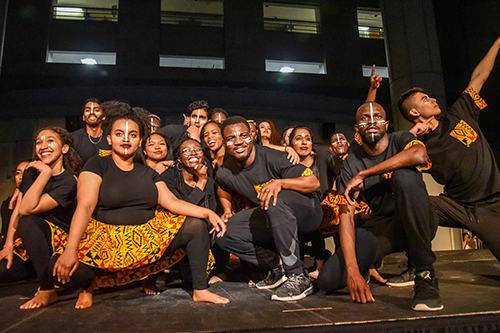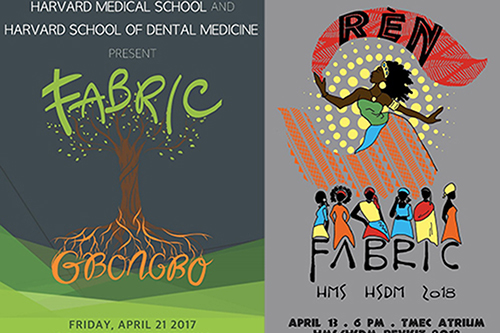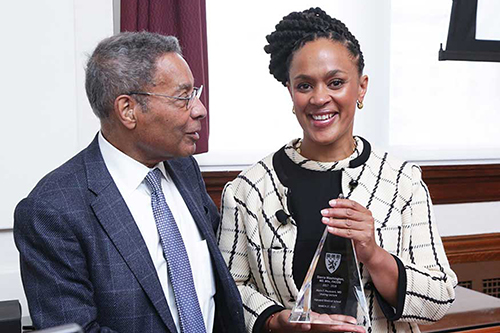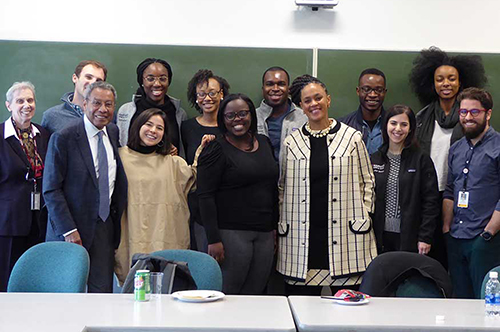Graduated Harvard Medical School Class of 2004
Dr. Washington is an associate clinical professor at the UC San Diego School of Medicine in the Department of Reproductive Medicine. Dr. Washington also works as an abortion provider at Planned Parenthood and was formerly the Medical Director and Chief Medical Officer of Planned Parenthood of the Pacific Southwest. She graduated from Harvard Medical School in 2004.
In 2001, student Sierra Washington co-founded FABRIC, an annual event celebrating the diverse backgrounds and talents of students in the Harvard Medical School and Harvard School of Dental Medicine community. Originally founded to explore the artistic and cultural traditions of the African diaspora, FABRIC has evolved through the years to include art forms and cultures from around the world. First-year students perform during Revisit Week and invite newly admitted students to join the community at the two schools. For more information about FABRIC visit: https://hms.harvard.edu/news/show-welcome.
“I had a lot of difficulty assimilating into the United States, mostly because the way that people conceive and conceptualize race really informs all of society, and I just wasn’t really ready for that. So I had a pretty tough time in university understanding how race just could permeate everything, everything that you do, and I felt a lot of pressure on campus to conform.” (time)
“I think I knew from very early on that I was going to go into medicine.” (time)
“After my trip to Thailand, it felt like, you know, I just, I know I want to do something in the world to alleviate poverty and suffering.” (time)
“The reason I ended up choosing going to the London School of Hygiene and Tropical Medicine is because I knew I wanted to work in Africa, and I knew I wanted to do work on HIV.” (time)
“I hated internal medicine; I hated it so much. I felt like, first of all, the nurses were mean and racist …, and treated me horribly. And second of all, I did not like the culture of like, OK, we spend five minutes with the patient, and then we sit in a room, a conference room, and discuss for hours, you know, should we do this, or should we do that? Is it this, or is it that? … I almost dropped out of medical school after that.” (time)
“I remember writing home and saying, like, this is 2000, and women are still dying in childbirth for no reason, you know, other than like, there’s just not enough resources being put to it.” (time)
“I just remember feeling like, you know, this is like a very impoverished side just on the backside of the hill, and you know, we’re right next to these ivory towers; it’s kind of crazy. One day I stopped into this school, and there was this guy who was like, yeah, I’d love for there to be an afterschool science program for young girls.” (time)
“We kind of started this curriculum project, and through that, we had this idea of like, maybe we should fundraise for a specific disease that strikes the black community. And, being an artist, I was like, why don’t we do an art show? Why don’t we showcase the fabric of the black community here in the Longwood area, because so many people, as I mentioned earlier, came to Harvard with already this incredible talent in something else, and decided to do medicine.” (time)
“How does that exist in 2000? Like, this is like, you know, this is pre-civil rights style segregation. And then that was borne out in the hospitals.” (time)
“Harvard’s no different than any other institution in having those things happen, other than it’s been around longer and has more entrenched this white privilege.” (time)
“And that was a mind-blowing experience, because things like, why was it easier for women to get an IUD in Rwanda than in the Bronx?” (time)



